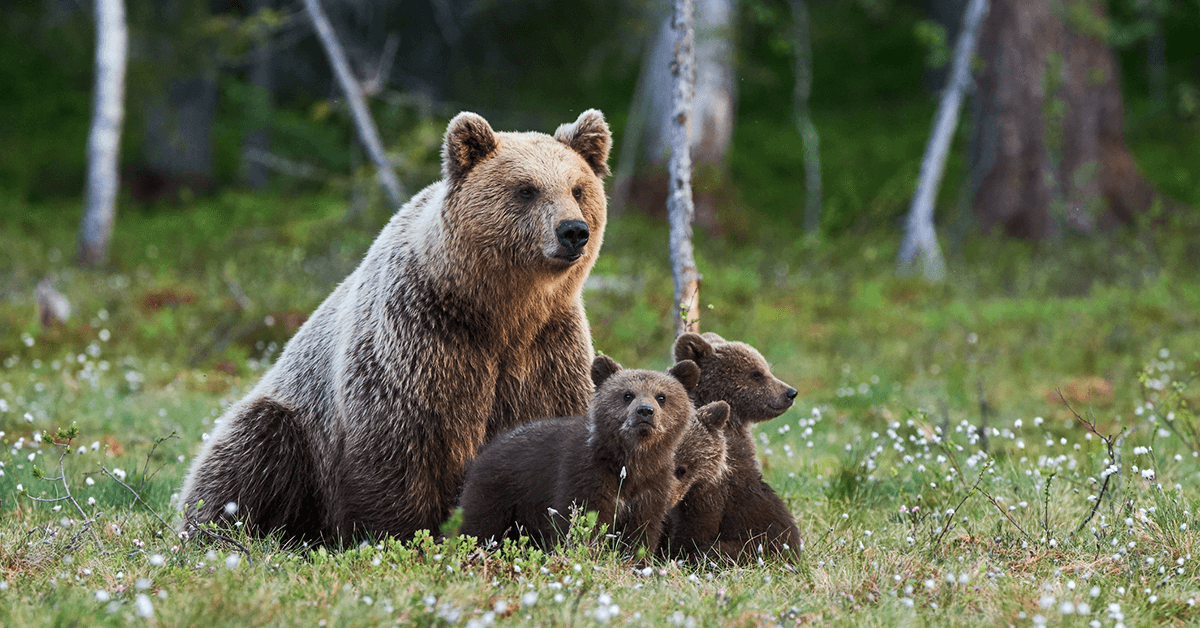
How to Protect Your Home In Bear Country
Homeowners in Wyoming know that summer is the grizzly bear’s active season. Most grizzlies emerge from hibernation in mid to late March and are active throughout the end of summer when they enter hyperphagia – an instinctual feeding frenzy in preparation for hibernation.
The resurgence of the grizzly bear population in Wyoming, and the Greater Yellowstone Ecosystem, is due to intensive federal recovery efforts. The Interagency Grizzly Bear Committee estimates that the population has rebounded to more than 700, up from 136 grizzly bears in 1975 when they were listed as a Threatened Species under the Endangered Species Act.
“We have documented an increasing distribution of grizzly bears throughout the Greater Yellowstone Ecosystem, which leads to a higher conflict potential, especially as bears expand into more agricultural, residential and human-dominated landscapes,” said Brian DeBolt, large carnivore conflict coordinator. As grizzly bears continue to extend their range, Wyoming homeowners should remain vigilant in bear-proofing efforts around their homes.
There are simple steps you can take to protect your home and avoid attracting bears to your property. Putting these preventative measures in place can help bears and humans live safely together.
- Properly Store Your Garbage: Garbage should be kept in bear-resistant containers or inside a secured building. Outside garbage cans should only be used for non-food items and should be hauled away at least once a week, if not more frequently.
- Be Mindful of Your Garden: Fruit trees, vegetable and flower gardens attract bears, especially when food is scarce. If your property contains fruit trees, make sure you pick ripe fruit immediately and do not let fallen fruit lie on the ground.
Vegetable gardens should be kept away from forests, which bears may use for protection as they move about. While maintaining a tidy and well-positioned garden will help deter bears from your property, the most effective way to keep bears away from your garden or orchard is electric fencing.
Composting in bear country is not recommended. Meat, grease, bones, and other decomposing food can be a huge attractant for bears. If you’re set on composting, enclose a bear-resistant composter with electrical fencing.
- Protect Your Pets and Livestock: Slow-moving livestock like sheep and pigs are an easy target for bears. Sheep should be closely herded, and electric fencing should be used to protect pigs. Dogs and other pets should be fed inside and kept inside at night.
For animals that must be fed outside, be sure to only feed them what will be eaten immediately. Food left outside throughout the day will attract bears.
- Store Feed Safely: It’s important to keep pet food and livestock and poultry feed stored inside a bear-resistant container in a secured building. Homeowners who have livestock on their property should take measures to reduce spillage when feeding their animals and avoid leaving food out overnight.
In Wyoming’s bear country, you should only use bird feeders when bears are hibernating. If you decide to feed birds in your yard during the grizzly bear’s active season, you’ll need to bring the seed in at night and every time you leave home.
- Secure the Exterior of Your Home: Any window that is accessible to bears should be locked when you leave home and when you go to sleep at night. You can install sturdy gates over windows that you prefer to leave open. If you have sturdy, climbable trees near the exterior of your home, consider removing low hanging limbs that might provide access to a second-story balcony or window.
Exterior doors should be sturdy and have round doorknobs. Lever-style door handles are easier for grizzly bears to push or pull open.
- Keep Your Home Odor-Free: Homeowners should avoid keeping anything with an odor outside or near an open window. This includes garbage, food, and even scented candles and lotions.
The most vigilant bear-proofing is no guarantee that a bear won’t, at some point, make its way onto your property and cause some damage.
Damage to your home caused by a bear is typically covered by a standard homeowner’s insurance policy- to some extent. Every insurance policy is different. But while damages caused by rodents are typically not covered under a standard homeowner’s insurance policy, damages caused by larger mammals typically are covered.
A standard policy will cover damage a bear causes to the structure of your home, it will not usually cover damages to your personal property. So, if a bear breaks down the door of your home and then tears up your couch rummaging for food, your policy would likely cover the cost to repair the door, but not the couch.
It is true that with the resurgence of grizzly bears in Wyoming the potential for conflicts with humans is on the rise. But homeowners in the area can take preventative steps to ensure the safety of their home, their property, and their families as grizzly bears extend their active range.
Time to Focus on Affordable Housing
Taxes on real estate are not the answer. Sign the petition calling on Congress to address our country’s housing shortage.





